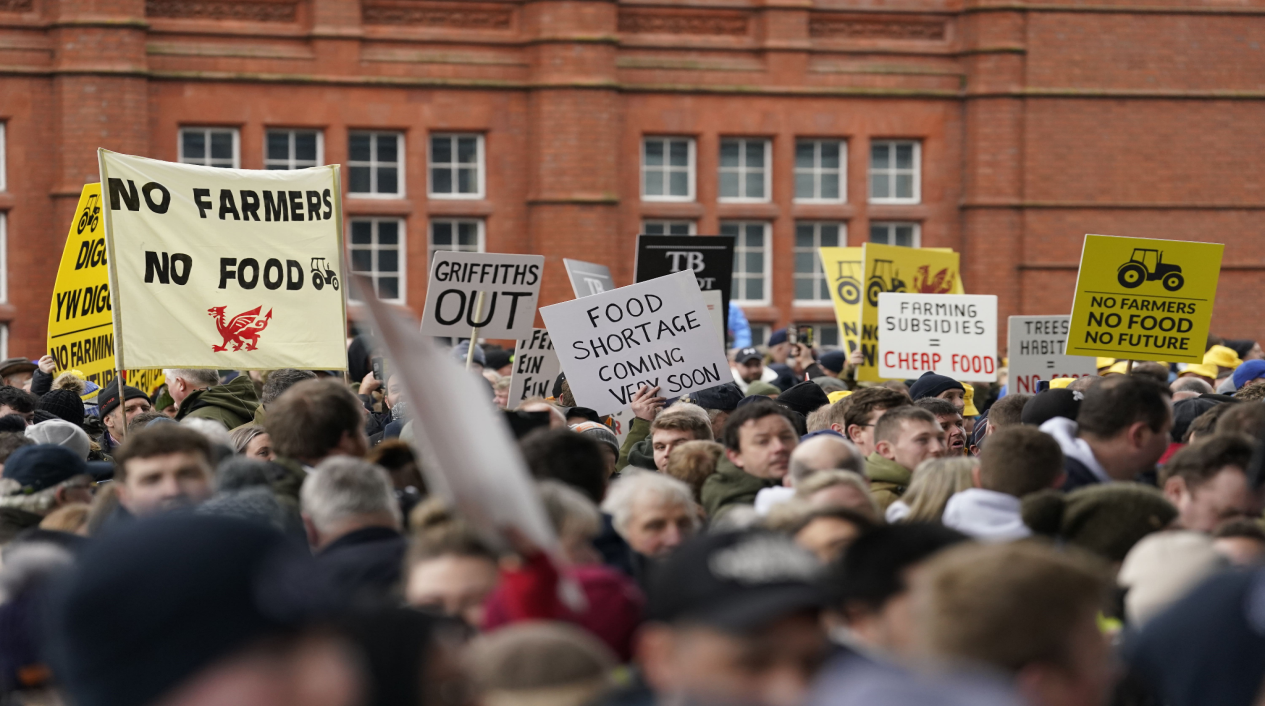Description

Copyright infringement not intended
Picture Courtesy: https://www.independent.co.uk/news/uk/protesters-welsh-government-welsh-labour-cardiff-bay-welsh-b2503996.html
Context: Spanish farmers protest in Madrid over price pressures, taxes, and green regulations, reflecting pan-European grievances amid climate change impacts.
Details
- Extreme Weather Events: The global rise in temperatures has led to an increase in extreme weather events in Europe, such as floods, droughts, heat waves, storms, and heavy rainfall. These events have negatively affected the agriculture sector, causing disruptions in crop production, delayed harvests, and damage to crops and infrastructure.
- EU's Response: In response to climate change, the EU introduced the European Green Deal in 2020. The deal includes ambitious targets to make the EU climate-neutral by 2050 and reduce greenhouse gas emissions by at least 55% by 2030. The "From Farm to Fork" strategy is part of this initiative, aiming to overhaul the agriculture sector.
- Regulatory Challenges: While the environmental regulations are designed to address climate change impacts, farmers in Europe are expressing discontent. They argue that the regulations are too strict, unfair, and economically unviable. Farmers face additional costs, especially with rising energy costs and the influx of cheap agricultural imports.
- Farmers' Backlash: Farmers' protests have emerged as a response to what they perceive as burdensome regulations. The protests involve blockades, rallies, and expressions of discontent across various European countries, including Poland, Germany, and Belgium. Farmers feel the cumulative pressure from multiple policies affecting their livelihoods.
- Rollback of Policies: Some EU governments have responded to the backlash by rolling back key environmental regulations. For example, Germany delayed cuts on diesel subsidies for agricultural vehicles, and France put a hold on plans to reduce pesticide use. The EU also scrapped a proposal to reduce pesticide use due to polarization.
- Remaining Challenges: Despite rollbacks, the EU still needs to find a balance between achieving environmental goals and addressing farmers' concerns about their livelihoods. Striking this balance is crucial for sustainable solutions that can effectively mitigate climate change impacts while supporting agricultural communities.
Climate Change and Farmer Protests
- Climate change refers to long-term shifts in temperature, precipitation patterns, and other atmospheric conditions. These changes are primarily driven by human activities such as burning fossil fuels, deforestation, and industrial processes. The consequences of climate change include extreme weather events, altered growing seasons, and unpredictable crop yields.
- Climate change is significantly disrupting agricultural patterns through extreme weather events like droughts, floods, heat waves, and wildfires. This leads to crop failures, reduced yields, and uncertain farming seasons. Farmers are facing immense pressure to adapt while also dealing with the economic repercussions of these changes.
- Farmers, especially in developing countries and marginalized communities, are disproportionately affected by climate change due to limited resources, dependence on rain-fed agriculture, and lack of technological support.
|
In Indian Context
●Agriculture is a crucial sector in India, employing a significant portion of the population and contributing significantly to the country's GDP. However, Indian agriculture is heavily dependent on monsoon rains, making it vulnerable to climate change impacts such as droughts and floods.
●Farmer protests in India have been ongoing for years, with various groups advocating for agricultural reforms, fair prices for crops, and debt relief. These protests intensified in late 2020 and early 2021 with the introduction of new agricultural laws by the Indian government, which farmers argue would deregulate the agricultural sector and leave them vulnerable to exploitation by large corporations.
|

|
How Climate Change and Agricultural Policies Affect Farmers
|
|
Factor
|
Explanation
|
Impact on Farmers
|
|
Climate Change
|
Erratic weather patterns: Unpredictable rainfall patterns disrupt planting and harvesting schedules, leading to lower crop yields and income uncertainty.
|
Reduced income: Lower yields mean less income for farmers to cover their expenses.
Increased risk: Unpredictable weather makes it harder for farmers to plan and manage their crops.
|
|
|
Droughts and floods: These extreme weather events can destroy entire crops, leading to significant financial losses and debt.
|
Debt burden: Crop losses can force farmers to take on debt to cover their expenses, increasing their financial vulnerability.
Food insecurity: Droughts and floods can lead to food shortages in affected areas.
|
|
|
Pests and diseases: Warmer temperatures create favourable conditions for pests and diseases to thrive, further damaging crops and reducing yields.
|
Reduced productivity: Increased pest and disease prevalence leads to lower crop yields and income.
Increased costs: Farmers may need to spend more on pesticides and other measures to control pests and diseases.
|
|
Policies
|
Inadequate support: Government policies may not provide sufficient support for farmers, such as through fair pricing, access to credit, or infrastructure.
|
Low income: Lack of adequate support makes it difficult for farmers to earn a decent living.
Increased vulnerability: Farmers are more vulnerable to economic shocks and climate change when they lack proper support.
|
|
|
Introduction of new laws without consultation: This can lead to concerns and confusion among farmers, especially if the new laws are perceived to be detrimental to their interests.
|
Loss of trust: Lack of consultation can damage trust between farmers and the government.
Increased anxiety: Uncertainty about the impact of new laws can create anxiety and stress among farmers.
|
|
|
Concerns about loss of minimum support prices (MSP): MSPs are a government-guaranteed minimum price for certain crops. Farmers fear that losing them could lead to a significant drop in their income.
|
Reduced income: If MSPs are lost, farmers could receive lower prices for their crops, leading to financial hardship.
Market instability: Loss of MSPs could make the agricultural market more volatile, making it harder for farmers to plan their finances.
|
|
|
Dismantling of the traditional procurement system: This system ensures that farmers have a guaranteed market for their crops at MSP. Farmers worry that dismantling this system could leave them vulnerable to exploitation by private companies.
|
Loss of bargaining power: Without the traditional procurement system, farmers may have less bargaining power when selling their crops, potentially leading to lower prices.
Increased dependence on private companies: Farmers may become more dependent on private companies for selling their crops, which could give these companies more power over the market.
|
What steps can the Government take?
- Policy Reforms: Governments need to enact policies that address the dual challenges of climate change and agricultural sustainability. This may include implementing climate-smart agricultural practices, investing in irrigation infrastructure, and providing financial incentives for climate adaptation measures.
- Dialogue and Consultation: Meaningful dialogue between policymakers and stakeholders, including farmers' unions, is essential for addressing grievances and designing effective policies. Consultative processes ensure that policies reflect the needs and concerns of those directly affected.
- Financial Support: Governments can provide financial assistance to farmers affected by climate change through subsidies, insurance schemes, and compensation for crop losses. This support helps farmers recover from climate-related disasters and invest in resilient farming practices.
Challenges
- Political Resistance: Implementing reforms to address climate change and farmers' concerns often faces resistance from powerful interest groups, including corporate lobbyists and entrenched political actors. Overcoming this resistance requires strong political will and public pressure.
- Resource Constraints: Many farmers lack access to resources such as credit, technology, and information, limiting their ability to adapt to climate change. Governments and development agencies must prioritize investments in rural infrastructure and capacity-building to support vulnerable farmers.
Way Forward
- Integrated Approach: Addressing climate change and agricultural sustainability requires an integrated approach that considers social, economic, and environmental dimensions. Policies should promote sustainable farming practices, biodiversity conservation, and community resilience.
- Empowerment of Farmers: Empowering farmers to participate in decision-making processes and access resources is crucial for building resilient agricultural systems. This includes strengthening farmers' organizations, providing extension services, and promoting farmer-led research and innovation.
- Global Cooperation: Climate change is a global challenge that requires collective action at the international level. Governments must honour their commitments under agreements such as the Paris Agreement and support developing countries in adapting to climate change and transitioning to low-carbon economies.

Conclusion
- Addressing the intertwined issues of climate change and farmer protests requires holistic approaches that prioritize the needs and rights of farmers while promoting environmental sustainability and social equity. By adopting inclusive policies and fostering dialogue and collaboration, governments can create resilient agricultural systems that benefit both farmers and the planet.
Must Read Articles:
EARTH’S SOARING TEMPERATURE: https://www.iasgyan.in/daily-current-affairs/earths-soaring-temperature#:~:text=According%20to%20a%20March%202023,consumption%20and%20production%20of%20goods.
Climate Change and Animals: https://www.iasgyan.in/daily-current-affairs/climate-change-and-animals
|
PRACTICE QUESTION
Q. Climate change has unequal impacts on farmers across the globe. Farmers in developing countries are often the most vulnerable yet may have less political leverage. How can international agreements and policies ensure that climate justice for farmers is achieved on a global scale?
|








